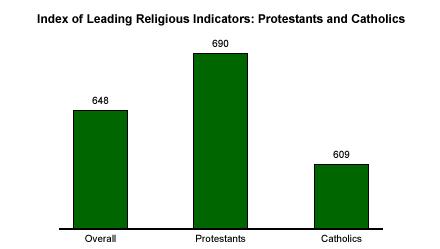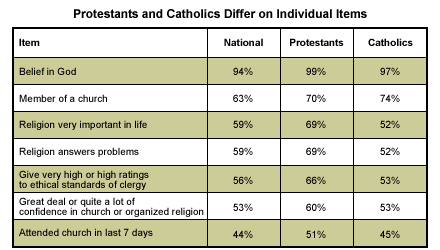It may be tempting to blame recent Catholic Church scandals for the fact that Catholics score lower than Protestants do on a long-standing ║┌┴¤═° measure of American religiosity. But the blame would be somewhat misplaced. A gap between Catholics and Protestants on some measures of attitudes toward religion appeared long before the widespread allegations of sexual abuse rocked the Catholic Church in 2002.

Protestants and Catholics Differ on Religious Beliefs
Catholics' responses to the questions that make up the 2004 ║┌┴¤═° Index of Leading Religious Indicators* add up to a score of 609, while Protestants score 690 -- a fairly substantial gap. Catholics lag noticeably behind Protestants on all but two of the survey items that make up the Index: belief in God and church membership. Virtually all Catholics and Protestants say they believe in God (97% and 99%, respectively), and Catholics claim church membership at a slightly higher rate than do Protestants -- 74% compared with 70%.
The widest gulfs separating Protestants and Catholics are on questions that address perceptions of religious life, rather than religious behavior. Regarding the importance of religion in their own lives, there is a significant gap, with 69% of Protestants saying religion is "very important" in their lives and 52% of Catholics saying the same. A similar pattern emerged in 1994, when 65% of Protestants and 51% of Catholics said religion was very important in their lives.
When it comes to perceptions of how religion affects society, the discrepancy is the same -- 69% of Protestants say they believe religion can answer most of today's problems and 52% of Catholics agree. There's little change on that measure from a decade ago; 71% of Protestants told ║┌┴¤═° that religion can answer most of today's problems in 1994, while 51% of Catholics said the same.
Ratings of Clergy and the Church
Protestants and Catholics rate the ethical standards of the clergy differently as well, though the gap here is a bit narrower. Two-thirds of Protestants (66%) give "very high" or "high" ratings to the ethics of clergy members, as do slightly more than half of Catholics (53%). Interestingly, these ratings differed between Protestants and Catholics in 1991 (the earliest year for which data are available) as well -- but in reverse. Back then, two-thirds of Catholics (65%) gave clergy members high or very high marks, while 58% of Protestants did so. Clearly, this is one instance in which the sex abuse scandals may have had an impact on Catholics' beliefs.
Members of both faiths are slightly less likely to express confidence in the church or organized religion today than they were in 1991. Confidence has fallen among Catholics by six points -- from 59% confident in 1991 to 53% in 2004, but only by three points for Protestants, from 63% to 60% during the same time period.
Church Attendance
║┌┴¤═° tracks church attendance as a fundamental indicator of religiosity, and there, too, Catholics fall behind Protestants -- but only slightly. Fifty-one percent of Protestants tell ║┌┴¤═° they attended church in the past week, compared with 45% of Catholics. However, the trend is more telling in this case: Church attendance has been declining steadily among Catholics since the question was first asked in 1955. At that time, 74% of Catholics and 42% of Protestants had attended religious services in the last seven days. Protestant church attendance first surpassed Catholic attendance in 2002 (see "Catholics Trail Protestants in Church Attendance" in Related Items).

Bottom Line
"Importance of religion is a key measurement that explains the overall lower Index score for Catholics," says George ║┌┴¤═° Jr., who has been analyzing American religious life since the early 1950s. "By a considerable margin, the gap shows that religion is less important for Catholics than Protestants. This wasn't always true. It would appear that Pope Paul VI's 1968 encyclical on birth control set in motion the decline in Catholic religiosity, particularly among the younger generation. But birth control is not the undergirding factor today that keeps Catholic religiosity lower than that of Protestants. Now, self-identification as 'Catholic' is often a cultural rather than a religious declaration, particularly for those who consider themselves 'lapsed' Catholics."
*Since 1941, ║┌┴¤═° has maintained an Index that provides broad annual assessment of religiosity among Americans, based on several measurements dealing with religious beliefs and practices. A "perfect score" would be 1,000. The 2004 Religion Index was compiled from surveys of national adults, aged 18 and older, conducted throughout the year.
